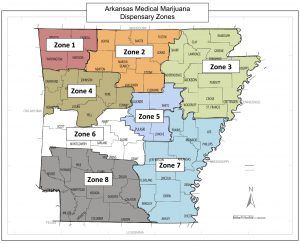Flurry of medical marijuana bids hit on deadline day, 200 out of 300 proposals submitted
by September 18, 2017 6:27 pm 1,376 views

After seeing a flurry of last-minute proposals Monday (Sept. 18) for Arkansas’ first pot-growing facilities and retail cannabis dispensaries, the state Medical Marijuana Commission (AMMC) must now sift through a mountain of applications to come up with the winners that will develop the infrastructure for the state’s newest startup industry.
Department of Finance & Administration spokesman Scott Hardin said between June 30 and Monday’s (Sept. 18) 4:30 p.m. application deadline, 300 applicants submitted bids for cultivation facilities and dispensaries to the Commission. Of that total, there were 200 applications processed Monday, leaving the state’s newest regulatory panel with the unenviable task of evaluating each one.
“(That) number will grow slightly as they have a handful of people left,” Hardin said at 4:30 p.m. Monday, adding that the “doors are now locked. No additional apps accepted.”
In early May, the Legislature approved the proposed emergency and regular rules submitted by the state Department of Finance and Administration (DFA). The Commission began accepting bids for five operators to up to eight marijuana growing facilities and another 32 dispensary applicants to operate up to 40 retail locations in eight quadrants of the state.
Altogether, there were 200 dispensary applications and 100 proposals for the state’s first legalized greeneries to grow marijuana for use in cannabis-related products submitted to the Commission. However, Arkansas medical patients can only purchase the products at a local dispensary with a doctor-approved medical marijuana ID card, courtesy of the Arkansas Department of Health (ADH).
Once delivered to the Commission, all 300-plus bids were time-stamped and applicants were immediately required to submit a payment voucher for the required fee of $15,000. To date, applicants have been able to modify a submitted application prior to the final submission deadline, but those proposals will be subject to the state Freedom of Information Act once that period ends.
“We won’t be releasing any information … until all applications have been ‘depersonalized’ and given to the Commission for scoring,” Hardin said. “With applications ranging from 500 to 3,000 pages, it is going to take some time for staff to get through each individual application.”

“(We) will release them at the same time to anyone who has requested them via (the) FOIA,” Hardin said.
Several applicants applying to obtain one of the elusive Arkansas-grown medical pot licenses or to receive a permit to open a cannabis retail dispensary have described the process to christen the state’s medical marijuana industry as “exhaustive” and highly-competitive.
‘FULFILLING INDUSTRY’
One of those applicants, Chris Stone of Springfield, Illinois-based HCI Alternatives, spent most of Monday afternoon completing an application for an investor-led partnership with Jonesboro pharmacists David Eddington and Mike Soo. The investor-backed group plans to build a dispensary and medical marijuana greenhouse in Northeast Arkansas.
Stone, CEO of HCI Alternatives, said his investor-back group plans to open a high-end dispensary in Jonesboro as well as a state-of-the-art cultivation facility in Monroe County under an Arkansas-based investor partnership know as Health Central Arkansas.
“When we first began to build our company in Illinois in 2016, we could not have imagined how many lives we would have touched in such a short period of time,” said Stone, adding that his Illinois-based cannabis firm now has 1,600 patients. “It’s a humbling and fulfilling industry with so many wonderful success stories. I am excited to be partnering with such respected pharmacists to help bring the same relief here to Arkansas.”
If HCA receives one of the five cultivation licenses, the investor group plans to build a 26,400 square-foot medical marijuana greenhouse in Brinkley. That facility would support 30 part-time construction jobs and 20-25 full time jobs during Phase I. Company officials said if patient demand grows as expected, HCA’s cultivation facility could grow larger than 200,000 square feet and eventually support 120 full-time jobs in Northeast Arkansas.
“We believe in the people and the communities of Jonesboro and Brinkley and are excited to be a part of a new kind of industry that will not only help Arkansans find a brand new and safe alternative to chronic pain and other debilitating health challenge but be a positive addition to the economic climate in both cities,” Soo said in a statement.
‘PLAYING PRETEND’
Several other investor groups who touted their plans to Talk Business & Politics, including dozens of applicants with out-of-state ties, have submitted plans for dispensaries and cultivation centers in every region of the state. A number of applicants also have monikers tied to Arkansas’ “Natural State” nickname, along with corporate marketing plans to grow a special hybrid of Arkansas-grown medical pot.
Sara Gullickson, CEO and founder of DispensaryPermits.com, has consulted with several companies that have or planned to file applications by Monday’s deadline. She was actively involved in Arkansas’ legislative draft process and advocated for a merit program instead of a lottery for selection of the cultivation and dispensary licenses at the Commission’s public hearings.
Gullickson, whose company is based in Scottsdale, Ariz., said her clients had to submit a 25-page narrative essay and blueprints concerning their projects, go through rigorous background and credit checks, and provide pro forma financial projections for the operations of marijuana growing facilities and retail locations.
Once all the applications are completed today, Gullickson said there will be an “anxious” waiting period and lull between the time the Commission grades the submissions and announces the winners.
“That’s when the real work starts,” Gullickson said. “Right now, everything that we are doing now is like playing ‘pretend.’ It’s like we are writing a college thesis paper and kind of getting everything in line. And once (ADH) pulls the trigger on us, then we have to take everything we’ve been playing pretend on and turn into an actual real project.”
